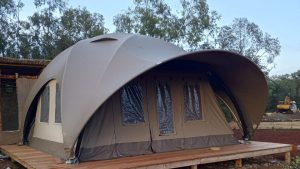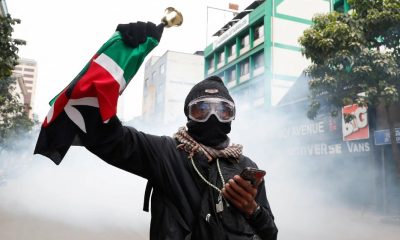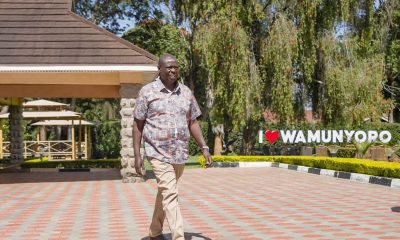News
MPs Blast KFS Senior Officials Over Fraudulent Award Of Special License To Ngong Road Hotel Owner
Construction of the controversial hotel began following approval by the KFS board on January 21, 2025, with a conditional Special Use License issued on February 12.

Members of Parliament have launched a scathing attack on Kenya Forest Service officials over what they term a fraudulent process that led to the controversial award of a special license to construct a luxury hotel inside Ngong Forest.
The National Assembly Environment, Forestry and Mining Committee, led by Mwala MP Vincent Musyoka, has raised serious questions about the transparency and legality of the licensing process that favored Konyon Company Ltd over the Green Belt Movement, which had earlier applied for a similar project.
During a heated session with Cabinet Secretary for Environment Deborah Barasa on Thursday, lawmakers accused KFS officials of bending rules to accommodate well-connected individuals behind Konyon Company Ltd.
The committee expressed outrage that the company was granted permission to build a glamping eco-lodge and wellness retreat in an area where the Green Belt Movement had been denied similar privileges due to unpaid fees.
“Our forests have been attacked by people who are well connected. The reason Konyon Company was given the licence—because the area doesn’t have trees—does not arise, because even shrubs are part of the forest,” declared Kacheliba MP Titus Lotee, rejecting the ministry’s justification for the project.
The controversy deepened when it emerged that the Green Belt Movement had been approved for a children’s museum project in the same forest in March 2022 but was locked out after failing to pay the requisite special license fees.
However, lawmakers noted that ministry documents presented to the committee contained no evidence that Konyon Company had paid the same fees that disqualified the environmental organization.
“I don’t see any attachment here indicating that Konyon Company paid this fee. It is not in your documents before us,” Turkana Central MP Joseph Emathe challenged ministry officials, demanding proof of payment.
The MPs questioned why KFS granted the license despite widespread environmental concerns raised by stakeholders and civil society organizations.
They accused both the ministry and KFS of ignoring the environmental impact assessment report by the National Environment Management Authority when approving the project.
Construction of the controversial hotel began following approval by the KFS board on January 21, 2025, with a conditional Special Use License issued on February 12.
However, public outcry erupted in May when photos of the construction site surfaced on social media, showing extensive ground preparation in what environmental activists described as encroachment into protected forest land.
Principal Secretary Gitonga Mugambi defended the project, arguing that the hotel was being constructed in an area with minimal tree cover as part of government efforts to create employment opportunities.
“We target the areas without trees because we also need to create jobs for our people,” Mugambi told the committee.
However, Njoro MP Charity Kathambi dismissed this justification, pointing to the contradiction with the government’s ambitious tree-planting program.
“We owe it to the coming generation—the Gen Zs—that we need to conserve our forests. But it is sad that we are now not planting trees; we are building hotels,” she said.
The committee has demanded comprehensive answers from the ministry, including clarification on the licensing process, evidence of fee payments, and comparative studies of similar forest commercialization projects in other countries.
They also want a detailed report on the status of other forests, particularly Karura Forest, which Chairman Musyoka described as “doing badly.”
The lawmakers have scheduled a visit to Ngong Forest next week to conduct their own assessment of the site and gather evidence for what appears to be shaping up as a major parliamentary investigation into forest management practices in Kenya.
The controversy has reignited debates about the protection of Kenya’s dwindling forest cover and the influence of powerful interests in securing access to public resources meant for conservation.
Kenya Insights allows guest blogging, if you want to be published on Kenya’s most authoritative and accurate blog, have an expose, news TIPS, story angles, human interest stories, drop us an email on [email protected] or via Telegram
-

 Business4 days ago
Business4 days agoCooking Fuel Firm Koko Collapses After Govt Blocks Sh23bn Carbon Deal
-

 Business3 days ago
Business3 days agoABSA BANK IN CRISIS: How Internal Rot and Client Betrayals Have Exposed Kenya’s Banking Giant
-

 Politics2 weeks ago
Politics2 weeks agoYour Excellency! How Ida’s New Job Title From Ruto’s Envoy Job Is Likely to Impact Luo Politics Post Raila
-

 Business2 weeks ago
Business2 weeks agoMinnesota Fraud, Rice Saga, Medical Equipment Deal: Why BBS Mall Owner Abdiweli Hassan is Becoming The Face of Controversial Somali Businessman in Nairobi
-

 Americas3 days ago
Americas3 days agoEpstein Files: Bill Clinton and George Bush Accused Of Raping A Boy In A Yacht Of ‘Ritualistic Sacrifice’
-

 News2 weeks ago
News2 weeks agoKenya Stares At Health Catastrophe As US Abandons WHO, Threatens Billions In Disease Fighting Programmes
-

 News2 weeks ago
News2 weeks agoDCI Probes Meridian Equator Hospital After Botched Procedure That Killed a Lawyer
-

 Investigations1 week ago
Investigations1 week agoPaul Ndung’u Sues SportPesa for Sh348 Million in UK Court, Accuses Safaricom Boss of Sh2.3 Billion Conspiracy
























